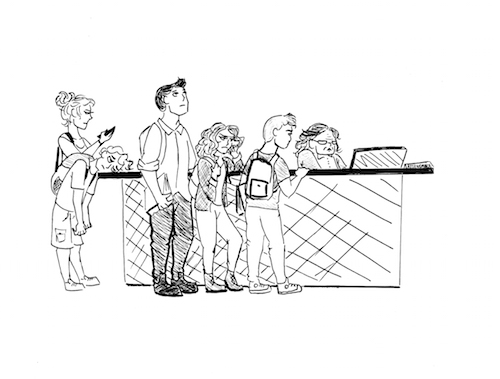Please reconsider the tardy policy
October 19, 2017
It’s that time of the year again: making goals to stay on top of your grades, adjusting to homework loads and, of course, bracing beneath the unrelenting tardy policy whip.
Upperclassmen accustomed to getting away with being late because of a “chill” first period teacher were met with a rude awakening the first week of school—a paper outlining the new tardy and attendance policy.
The lenient image of LBHS is no longer as we know it. The amount of tardies tolerated before a detention changed to a mere two, and what follows isn’t much prettier. A student’s third offense now merits contact home, while a fifth tardy results in the loss of athletic and extracurricular privileges in addition to receiving a Saturday School.
This also puts a strain on teacher and student relationships. Multiple teachers have said they couldn’t remember the last time they gave a detention before this new policy. They also have shared that this is causing a strain on how students connect and talk with their teachers because students now see their teachers as disciplinarians, when in reality, the teachers are just following directions.
This new tardy policy is also majorly affecting student athletics. After a fifth tardy, the student-athlete is benched during games and practices, causing a lot of .unnecessary disruption on teams.
It’s clear that the school is attempting to solve tardiness, but I don’t really see the stricter policies holding any more influence than the older policies. The kinds of students who are habitually late, probably the kind the stricter rules were made for, won’t be intimidated by the threat of a detention. Honestly, if there are kids who already have 50 demerits, they probably won’t be scared by one more.
Additionally, students weren’t given the chance to adjust to the policy since it was changed so dramatically. It’s hard for students not to react defensively when the change was sprung on us on the first day of school. And what about the people who’ve only had one slip-up?
This leaves those, who are normally on time, holding the short end of the stick. They now face harsher consequences becauses the habitually tardy kids couldn’t bother waking up a little earlier.
Lastly, unpredictable Laguna Canyon Road traffic affects many of our high school students. Those needing to travel this route to school face much greater challenges than students who live immediately in town. An accident or uncontrollable heavy traffic in the Canyon shouldn’t equate to an Unexcused Tardy.
At the end of the day, students and many teachers can agree that detention is terrible and doesn’t afford learning opportunities—perhaps administration can open dialogue with the student body to find more suitable ways to hold us accountable.







